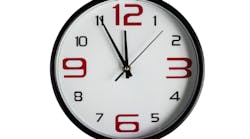Human Resources Questions for Dentists: Legally keeping track of employee hours worked
This article originally appeared in the Principles of Practice Management e-newsletter. Subscribe to this informative twice monthly practice management ENL here.
The human resources landscape is constantly changing. Dentists have ongoing questions about how to handle staff issues. Take this month's questions, for instance. Could this dentist face legal action after a big argument with an employee? And, how should this office pay a hygienist who wants to earn extra money cleaning the office?
QUESTION: We have the ability to set up our timekeeping system to automatically deduct 30 minutes for employee lunch breaks. We would like to implement this since many of our employees often have trouble remembering to clock out and clock in for lunches. This has become a real hassle at payroll time. An automatic system would make things a lot easier on our end. Is this allowable?
ANSWER: There is nothing illegal about setting up the system as you suggest. If it is set up this way and all of your employees take their lunch breaks as required, then this is certainly easier for everyone involved and would appear to prevent mistakes. However, not all employees will take their lunch breaks and may actually end up working instead. If the time is automatically deducted and is not corrected at payroll time, you could wind up with a wage claim for unpaid wages. Therefore, you must exercise care and caution if you go through with this plan.
Instead of switching to this system, which will impact all employees, consider addressing only those employees who forget to manage this part of their job correctly. In other words, appropriately counsel them about this problem by setting clear expectations going forward and holding them accountable if they fail to improve.
If you move forward with automatic deductions, be sure you have a system of checks and balances at the end of each pay period. Be sure employees review, approve, and sign off on their hours as being correct in order to avoid mistakes and future problems.
QUESTION: We have been told we need to have our employees sign their time records. We don’t currently do this. Is there a valid reason for doing this? What if the time records are done electronically?
ANSWER: While there is no law that mandates time records be signed, it is a good business practice to do so. You may have employees sign a printout of their time records for all hours worked or present them with a summary of their hours. Either way, having them review and sign off on the hours is recommended.
This is because employees can file claims for unpaid wages, particularly overtime, for up to three years after the actual time is worked. If you have no proof that the hours were correct, it can become a very costly claim for you. To avoid problems, have employees sign that they certify the hours are correct in case anything is ever questioned at a later date.
RECENT HR QUESTIONS FOR DENTISTS
The ongoing issue of paying for dental employee CE
Could this ugly argument lead to legal action?
Must dentist pay same insurance during employee's leave of absence?
Human Resources Questions for Dentists is provided by Rebecca Boartfield and Tim Twigg of Bent Ericksen & Associates. Tim Twigg is president and Rebecca Boartfield is a human resources compliance consultant with Bent Ericksen & Associates. For 30 years, the company has been a leading authority in human resource and personnel issues, helping dentists deal successfully with the ever-changing and complex labor laws. To receive a complimentary copy of the company’s quarterly newsletter or to learn more about its services, call (800) 679-2760 or visit bentericksen.com.
For the most current practice management headlines, click here.
For the most current dental headlines, click here.
About the Author

Rebecca Boartfield and Tim Twigg
Human Resources Experts
Tim Twigg is president and Rebecca Boartfield is a human resources compliance consultant with Bent Ericksen & Associates. For 30 years, the company has been a leading authority in human resource and personnel issues, helping dentists deal successfully with the ever-changing and complex labor laws. To receive a complimentary copy of the company’s quarterly newsletter or to learn more about its services, call (800) 679-2760 or visit bentericksen.com.
